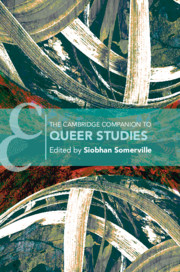Book contents
- The Cambridge Companion to Queer Studies
- The Cambridge Companion to Queer Studies
- Copyright page
- Dedication
- Contents
- Figures
- Contributors
- Acknowledgments
- Chronology
- Introduction
- Part I Genealogies
- Part II Confluences
- Part III Representation
- Part IV Key Words
- Chapter 13 Queer Diasporic Crossings and the Persistence of Desire in The Book of Salt
- Chapter 14 Diaspora, Displacement, and Belonging
- Chapter 15 Queer Critical Regionalism
- Index
- Cambridge Companions to …
- References
Chapter 14 - Diaspora, Displacement, and Belonging
The Politics of the Family and the Future of Queer Kinship
from Part IV - Key Words
Published online by Cambridge University Press: 02 June 2020
- The Cambridge Companion to Queer Studies
- The Cambridge Companion to Queer Studies
- Copyright page
- Dedication
- Contents
- Figures
- Contributors
- Acknowledgments
- Chronology
- Introduction
- Part I Genealogies
- Part II Confluences
- Part III Representation
- Part IV Key Words
- Chapter 13 Queer Diasporic Crossings and the Persistence of Desire in The Book of Salt
- Chapter 14 Diaspora, Displacement, and Belonging
- Chapter 15 Queer Critical Regionalism
- Index
- Cambridge Companions to …
- References
Summary
Through an examination of Henrique Cirne-Lima and Josué Pellot’s 2010 documentary film I Am the Queen about transgender Puerto Rican beauty queen pageants in Chicago’s Humboldt Park neighborhood, this chapter discusses how queer diasporic communities in the US navigate family and kinship in light of racial, sexual, and gender difference. Underscoring the importance of decentering conventional notions of kinship while remaining attuned to the way “given” families may in fact link up to “selected” families for purposes of communal sustenance and endurance, the chapter highlights the film’s aim to represent alternative formations of family and kinship as they relate to diaspora and displacement. Ultimately, Cirne-Lima and Pellot’s film offers a vision of the struggle to belong in the context of the loving competition of the beauty pageant while also accounting for the struggles of historically marginalized and maligned communities such as the transgender Puerto Rican women the documentary represents.
Keywords
- Type
- Chapter
- Information
- The Cambridge Companion to Queer Studies , pp. 215 - 227Publisher: Cambridge University PressPrint publication year: 2020
References
Further Reading
- 1
- Cited by

